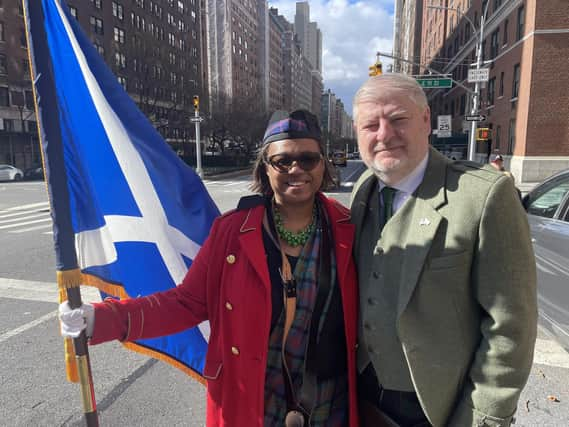Role of African-Americans in Scots diaspora is key theme of Tartan Day - Angus Robertson


For the first time the role of African-Americans in the Scots diaspora was a key theme. It has been a long time coming and was widely welcomed by Scottish diaspora organisations and members.
As thousands of pipers, dancers and other participants marched down New York’s Sixth Avenue on the Tartan Day parade behind guest of honour Dougray Scott, the honour-guard Saltire flag was carried by Lolita Jackson, an African-American Scot.
Advertisement
Hide AdAdvertisement
Hide AdThroughout a week of activities to promote Scottish connections to the United States and Canada, there were themed events recognising the fact that a significant proportion of African-Americans are of Scottish descent and also the significant connections between African-Americans and Scotland, including the great abolitionist Frederick Douglass.
A special event involving the Scottish Government was hosted with the New York Genealogical and Biographical Society (NYG&B) and included many of the city’s leading African-American historical researchers.
Discussions centred on the millions of Americans that descend from the more than 150,000 Scots who had settled in North America by 1785. Many of those settlers, like a great many settlers of the time, took part in the transatlantic slave trade.
A grant from the Scottish Government’s Scottish Connections Fund has enabled the NYG&B to engage the services of expert researchers to compile a guide and accompanying resources to trace biographical and genealogical connections to those enslaved individuals. The information gathered provides an introductory framework for those seeking to identify connections to this important – but widely unexamined – element of the Scottish diaspora.
Advertisement
Hide AdAdvertisement
Hide AdOn the same day I laid a wreath at the New York statue of the great 19th century abolitionist Frederick Douglass, who had major connections to Scotland. Douglass, who chose his own surname after liberation from slavery from Sir Walter Scott’s poem, Lady of the Lake, made extensive tours to Scotland and was known as “Scotland’s anti-slavery agent”.
As the National Library of Scotland has highlighted in a special online resource Douglass delivered hundreds of public lectures during his anti-slavery tours in 1846 and 1847, and again in 1859 and 1860. His impassioned lectures and powerful oratory attracted standing-room only crowds and gained him international renown.
Scotland is also particularly important in African-American history because it was Glasgow University that welcomed James McCune Smith to undertake his medical degree. The physician, apothecary, abolitionist and author was the first African-American to earn a medical degree anywhere.
As more and more people take DNA tests to establish the story of their ancestry, the more African-Americans are learning that they have Scottish connections. This is the story of Jameel Lee who I met when at the World Bank in Washington DC where he works. He recently learnt through an ancestry test that he has Nigerian, Ghanaian and Scottish heritage. He now wants to visit Scotland.
Advertisement
Hide AdAdvertisement
Hide AdI am pleased that the Scottish Government’s Connection Framework takes a broad, welcoming and inclusive approach to Scotland’s diaspora. It is high time that we do everything to acknowledge and welcome African-Americans, Native-Americans and others as a part of our national story. Wouldn’t it be good to see an African-Scottish and Native-American tartan worn at future Tartan Day events?
Angus Robertson MSP is Constitution, External Affairs and Culture Secretary